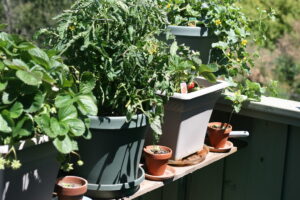
“Family Dog in Garden, 1987 | Pepper was …” from www.flickr.com and used with no modifications.
Key Takeaways
-
Biochar is a carbon-rich product that improves soil health and is generally safe for use in gardens with dogs.
-
While biochar itself is non-toxic, it’s crucial to ensure proper application to prevent accidental ingestion or inhalation by pets.
-
Monitoring dogs for any unusual behavior after applying biochar can help quickly address potential issues.
-
There are dog-friendly alternatives to biochar that can also enrich garden soil without any risks to pets.
-
Engaging with experts and using high-quality biochar products can ensure the safety of both your garden and your furry friends.
A Closer Look at Biochar’s Impact on Dog Safety
As a gardener, you’re always looking for ways to enrich your soil and boost your plants’ health. Biochar, a kind of charcoal used to improve soil fertility, is a great option. But if you’re a dog owner, you might wonder, “Is biochar safe for my four-legged friend?” Let’s dive into this topic and ease your mind.
Common Concerns for Dogs in the Garden
Our gardens are often a shared space between us and our pets. It’s where we cultivate our plants and where our dogs love to play and explore. However, it’s also a place where they can come into contact with various substances, from fertilizers to pest control products. It’s our responsibility to ensure these substances, like biochar, are safe for them.
Digging Deeper: The Safety of Biochar for Canine Companions
First off, let’s clarify what biochar is. It’s a stable, carbon-rich form of charcoal that’s produced by heating organic material, like wood, in a controlled environment with little to no oxygen. This process, known as pyrolysis, results in a substance that’s excellent for soil amendment. But what does this mean for your dog?
Composition of Biochar and Potential Hazards
The good news is that biochar is typically free of chemicals that could be harmful to your pet. It’s an all-natural product with no additives that could pose a risk to dogs if used correctly in the garden. However, like any product, it comes down to the details of its use and handling.
Is Biochar Toxic?
No, high-quality biochar is not toxic. It’s been used for centuries to improve soil health and is safe for humans, animals, and plants. But as a cautious gardener and pet owner, it’s essential to understand that the safety of biochar also hinges on how it’s applied and the specific behavior of your dog.
For example, if your dog is the curious type that likes to dig around and taste everything in sight, you’ll want to be extra careful. Most importantly, while biochar itself isn’t toxic, the dust from the product can be an irritant if inhaled, and large pieces can pose a choking hazard.
Therefore, when incorporating biochar into your garden, take steps to minimize these risks. Here’s how:
-
Moisten the biochar before applying it to reduce dust.
-
Work the biochar thoroughly into the soil to prevent your dog from ingesting it.
-
Keep your dog away from the garden during and immediately after the application of biochar.
Preventive Steps to Protect Your Pooch
Now that we’ve established that biochar can be safe around dogs, let’s focus on how to apply it without causing any issues. Your garden can flourish, and your dog can continue to frolic without worry.
First, always choose a high-quality biochar product. One that is made from only natural materials and void of plastics or man-made chemicals. This ensures that you’re not introducing any unwanted materials into your garden. Next, consider the size of the biochar. Finely ground biochar is less likely to be picked up and chewed on by your curious canine.
Most importantly, when you’re ready to apply biochar to your garden, keep your dogs indoors or in another part of your yard. This is just a precaution to ensure they don’t walk through the area and breathe in any dust or get it on their paws, which they might lick later.
When Paws and Plants Mix: Insights on Biochar Use Around Dogs
Understanding how dogs interact with biochar-treated soil is crucial for gardeners who share their green space with canine companions. Dogs are naturally curious creatures, and their instinct to sniff, dig, and sometimes taste garden soil can put them at risk if we’re not careful about the products we use.
Dogs’ Interaction with Biochar-treated Soil
After biochar is applied to the garden, it’s common for it to be visible on the soil surface until it’s fully integrated. During this time, a dog may come into contact with biochar particles. The risk of ingestion or inhalation is relatively low, especially once the biochar is worked into the soil, but it’s still something to be mindful of, particularly during the initial application phase.
Therefore, it’s wise to supervise your dog’s garden activities after applying biochar. Notice if your dog is taking an unusual interest in the soil. If so, it may be best to distract them with play in another area or introduce a barrier to keep them away from treated sections of the garden temporarily.
Monitoring Your Dog’s Health: Signs to Watch For
If you’ve recently applied biochar to your garden, keep an eye on your dog for any signs of distress. While biochar is not toxic, any foreign substance ingested in large amounts can cause issues. Watch for coughing, which could indicate inhalation of dust, or changes in stool, which could suggest ingestion.
Should you notice any abnormal behavior or physical symptoms, contact your veterinarian. They can provide advice or treatment if necessary, ensuring your dog stays healthy and happy.
Alternatives to Biochar: Safe Gardening with Dogs
For dog owners looking for peace of mind, there are alternatives to biochar that can still enrich your soil without worry. It’s about finding the right balance for your garden’s needs and your dog’s safety.
Choosing Dog-Friendly Garden Amendments
Here are some dog-friendly options to consider:
-
Compost: A great all-natural soil amendment that improves soil structure and adds nutrients.
-
Worm castings: These are not only a fantastic source of nutrients but also safe for pets.
-
Peat-free potting mixes: They offer a sustainable option without the risks associated with biochar.
When choosing any product, always check the label for any warnings regarding pets and opt for organic and natural options whenever possible.
Tips for Creating a Pet-Friendly Garden Environment
Creating a garden that’s both beautiful and safe for dogs doesn’t have to be a challenge. Here are some tips:
-
Choose robust plants that can withstand a little roughhousing.
-
Avoid using cocoa mulch, which can be toxic to dogs if ingested.
-
Set up a designated digging area for your dog to satisfy their digging urges without disturbing your plants.
-
Always have fresh water available to keep your dog hydrated and deter them from drinking from ponds or puddles, which may contain fertilizers or other chemicals.
Ensuring a Thriving Garden Without Compromising Fido’s Health
It’s entirely possible to have a lush garden and a healthy dog coexisting in harmony. By being mindful of the products we use and how we use them, we can create a safe environment for all.
Maintaining the Balance: Plant Health and Pet Safety
When you choose to use biochar or any other garden product, always consider its impact on both your plants and your pets. Biochar has many benefits for your garden, but it should be used responsibly to ensure the safety of your dog.
Here’s a quick checklist for using biochar safely in a pet-friendly garden:
-
Always supervise your pets in areas where biochar has been applied until it’s fully incorporated into the soil.
-
Store biochar and other garden products out of reach of pets.
-
Be vigilant for any changes in your pet’s behavior or health after using new garden products.
Expert Recommendations for Dog Owners with Green Thumbs
As someone passionate about both their pets and their garden, it’s natural to seek a harmonious balance. The key is to be well-informed and proactive. Start by researching the biochar product you plan to use. Look for any pet-related information or warnings provided by the manufacturer. If in doubt, consult with a professional—this could be a knowledgeable staff member at your local garden center or a horticultural expert.
Another crucial step is to observe how your dog interacts with the garden. Some dogs may show little to no interest in garden beds, while others might be diggers or chewers. Knowing your dog’s habits allows you to tailor your gardening practices accordingly. For instance, if your dog is a digger, you might need to create a physical barrier to protect both the biochar-treated soil and your dog.
Example: A dog owner noticed her terrier, Max, was particularly interested in a freshly treated biochar patch in the garden. To prevent any problems, she created a temporary fence around the area and provided Max with an alternative digging spot filled with sand and some hidden toys to redirect his attention. This proactive approach kept Max safe and allowed the biochar to integrate into the soil without disturbance.
Lastly, consider integrating biochar into your garden during a time when you can monitor your dog’s interaction with the area closely. If you apply biochar and then leave for the day, you won’t be able to observe and prevent any potential issues. Plan your gardening activities for when you can be around to supervise your pet.
Remember, the goal is to create a safe and stimulating environment for your dog while also nurturing a healthy garden. With careful planning and a bit of creativity, you can achieve both.
Frequently Asked Questions (FAQ)
What Exactly is Biochar?
Biochar is a form of charcoal that’s specifically designed for use in soil enhancement. It’s created by heating organic material, such as wood, manure, or leaves, in an environment with limited oxygen. This process, known as pyrolysis, produces a porous charcoal that can help improve soil fertility, water retention, and carbon sequestration. It’s a sustainable choice for gardeners looking to boost their soil’s performance naturally.
Can Biochar Affect the Health of My Dog?
Biochar itself is not toxic and is considered safe for dogs. However, like any garden product, it should be used responsibly. If a dog ingests large amounts of biochar, it could potentially lead to gastrointestinal blockage or discomfort. Additionally, inhaling biochar dust can irritate a dog’s respiratory system. The key is proper application and ensuring that your dog doesn’t have access to loose biochar.
How Do I Safely Apply Biochar If I Have Pets?
To safely apply biochar in a garden with pets, follow these steps:
-
Moisten the biochar to minimize dust before application.
-
Work the biochar into the soil thoroughly to prevent it from being accessible to pets.
-
Keep pets away from the treated area until the biochar is well integrated.
-
Store biochar in a secure location where pets can’t reach it.
By taking these precautions, you can safely enjoy the benefits of biochar without compromising your pet’s well-being.
What Are Some Safe Alternatives to Biochar for Dog Owners?
If you’re looking for alternatives to biochar that are safe for dogs, consider the following options:
-
Organic compost: Rich in nutrients and safe for pets, it improves soil structure and fertility.
-
Worm castings: A gentle, natural fertilizer that’s also non-toxic to pets.
-
Coco coir: A sustainable and pet-safe medium that enhances soil aeration and moisture retention.
These alternatives can provide similar benefits to biochar without the worry of pet safety.
How Can I Tell If My Dog is Reacting Badly to Biochar?
If you’ve used biochar in your garden, be vigilant for any signs of discomfort or illness in your dog. Symptoms to watch for include:
-
Excessive coughing or sneezing may indicate dust inhalation.
-
Vomiting or diarrhea, especially if you suspect your dog has ingested biochar.
-
A change in behavior, such as lethargy or loss of appetite.
If you observe any of these signs, contact your veterinarian immediately. It’s always better to be cautious and ensure your dog’s health is not at risk.



